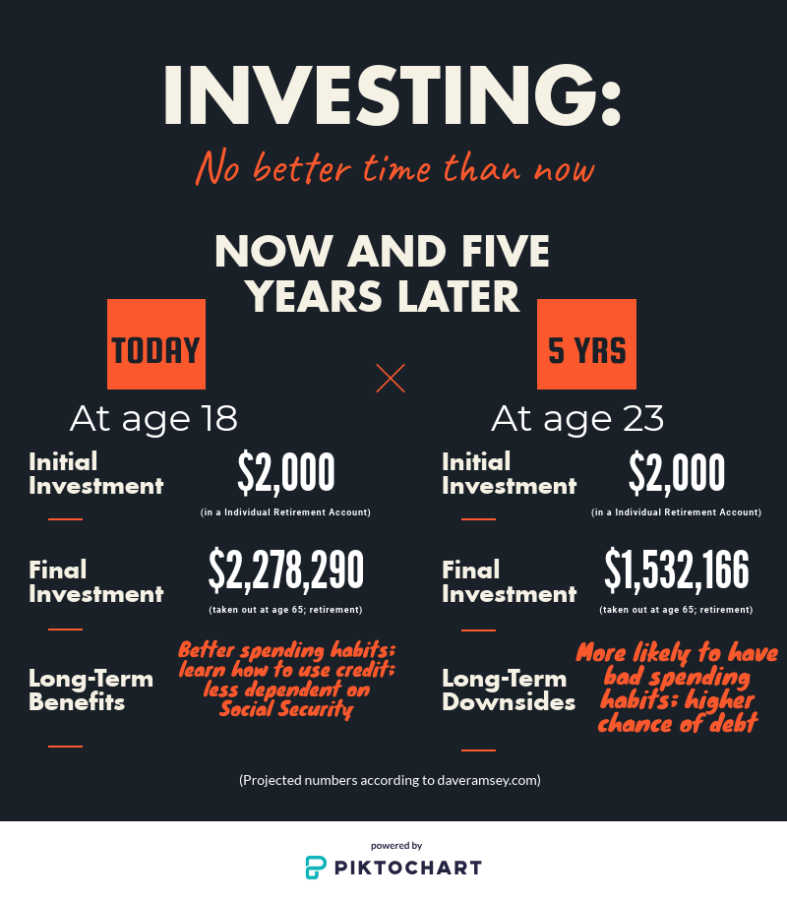The time is now to begin your own investing journey – even for us teenagers
With advice from teachers and financial advisers, individuals our age should get into the market as soon as possible
Created by Chris Hudson/Piktochart
Using projections, starting to invest now against five years down the road can prove major financial differences in the money returned from your investments.
Five years.
It equates to 1,825 days and for most of us teens, it’s almost ¼ of our current lives. Pretty big, right?
The same goes for fundamental investing: starting just five years earlier than at a later point will typically result in more money earned down the road.
It hasn’t been a major focus in our youth day-to-day hustle, but by finding a trusted broker, researching stocks, forming a portfolio and throwing your hat in the ring now – at let’s say the age of 18 rather than 23 – will bring you exponentially huge compounding benefits. In short, you might feel like you own a money tree in your backyard.
Why? Because time is money. And more time to be had means more money to be made.
The avenues that become available to you from going ahead and choosing to do more with your money gives you a hefty upperhand to millions of other investors across the globe.
According to data accumulated by stocktrader.com, young investors who begin the soonest they can will be able to avoid making money moves near or during their retirement, as well as having a less stressful quality of life during that same time period decades away.
Might be a shot in the dark here, but I’m guessing all of you wouldn’t want to go through that solo 401k or Simple IRA (Individual Retirement Account) hassle while unprepared at any age in your life.
Solution: educate yourself and join the investing game before someone else beats you to it. Early bird gets the worm; shown through projections by daveramsey.com – a person can earn almost $750,000 more by originally investing $2,000 at 18 years old rather than initiating the investment at age 23.
Just let that sink in. An average of $37,500 a year on top of your annual salary.
I’m definitely not advising to go in head-first and think that you’ve got nothing to lose – that’s how the Great Depression happened. Don’t want another round of that 100 years later, at least for you on a personal level, now do we?
I know I’m throwing a lot of bait out that makes it hard not to take a bite and buy some of your own stocks right now, but what’s crucial is that you do it right and know what you are getting into.
Investing early also improves your spending habits, which might seem like a paradox, but it’s true: you’ll learn to not overstep your boundaries with purchases and you’ll not be as prone to future debt by knowing how many important lessons investing can teach you. It’s an investor thing.
Take Aaron Smaka: he became an investor at 24, but still has expressed his regret of not investing early many times.
“Given today’s uncertainties with Social Security and pension plans, you have to plan for retirement, do it on your own and time is your biggest friend,” Smaka said.
“Being able to do that as a young person, being 17 or 18 [years old] through a Roth IRA, I think it’s a good idea to begin sooner so that you can take care of yourself into your future.”
Smaka even acknowledged the specific scenario that I’m using in this piece – the time we currently live in today and how it will be different five years from now.
“A lot of people wait to start saving for retirement until they get a job out of college,” Smaka said. “But, that’s a five year period where even a little bit of money to put away can have a big impact when you get older.”
Hate to break it to all of you, but it’s the truth that we won’t stay in this comfortable high school bubble forever.
When it bursts for us, don’t you think it’d be nice to have money to lean on for the unexpected that we don’t account for? Yeah, I agree.
Pushing past the anecdotal buying points, beneficial programs shared by Julie DeSanto at Grand Haven’s local Edward Jones firm solidify that there are definite long-term positives for getting into investing during the late high school and early college years by using features right on the financial agency’s website (link tagged below).
“We have an online tool that calculates your retirement and it can factor in social security or not,” DeSanto said. “You can plug in any number for your initial investment and see how much it’ll grow when you retire at 62 or 67 or whenever. The important thing is that more time you have to invest and put away that money, the higher return you’ll get back later on.”
DeSanto showed me multiple components that hammered home a common idea or what she referred to as “the roadmap”: with the key being to know where you are at point A and how you will get to point B – when you pull out your returns and/or retire.
“When we talk to anyone about opening an account, we have a process about what’s going on today and what’ll be going on six months from now and so on,” DeSanto said. “Obviously, things will occur and possibly change the plan we had in place for the account, but one thing remains the same – you and I will stay on track and keep your investments where they need to be in order to meet your income or growth goals.”
Having an advisor like DeSanto by your side is what can make or break your investing experience and is what will help you get the greatest return you can manage; It’s almost a guarantee to help you get into the market and survive it at any age.
So think about that roadmap – we’ve all began our journey and with each day that passes, we inch closer to point B: the final destination.
*To get started, visit EdwardJones.com and check out the different financial calculators using the search tool*

Senior Chris Hudson is in his last rodeo at Grand Haven High School and unfortunately, his last go with the Bucs’ Blade, this time as Editor-In-Chief....

